The science of alcohol: How booze affects your body
- Published
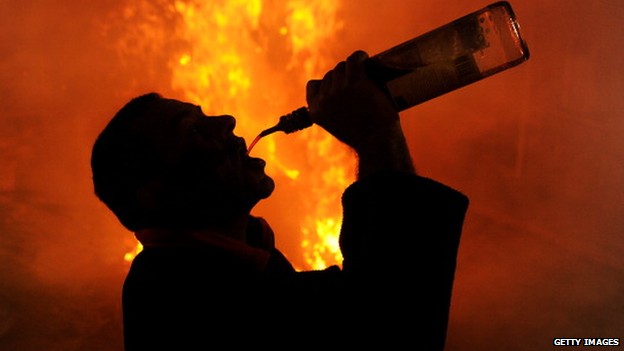
Alcohol: your body treats it as poison
Drinking alcohol can make humans feel pretty good, at least in the short term.
From that very first sip of beer, wine or vodka, the alcohol travels to your stomach and into your bloodstream.
It then makes its way around the whole body: your brain, your mood and your muscles. The process starts within minutes of your first sip.
The level of alcohol in your blood will peak about 45 to 90 minutes later, according to the NHS. , external
So what is really going on?
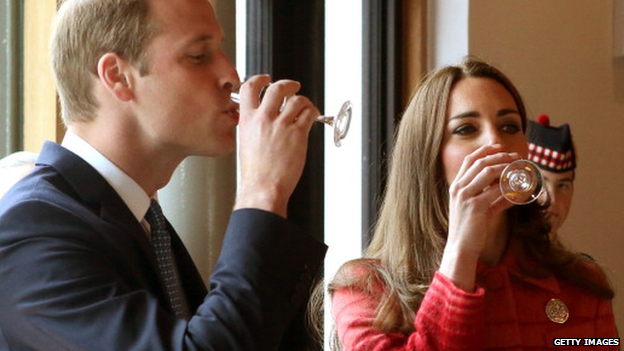
Alcohol is part of our culture
Your body sees alcohol as a poison. It can't store it, so wants to break it down and get rid of it. This is where the liver comes in.
Your liver converts alcohol into a number of different chemicals to allow your body to break it down, and get rid of it.
Enzymes do this.
In this case, the liver uses an enzyme called alcohol dehydrogenase to convert the alcohol into what is actually a pretty toxic substance called acetaldehyde (sometimes the production of this substance is what can make you feel hungover).
At least acetaldehyde doesn't make you feel intoxicated though, and it can be worked on more easily to shunt the rest of the alcohol from your system.
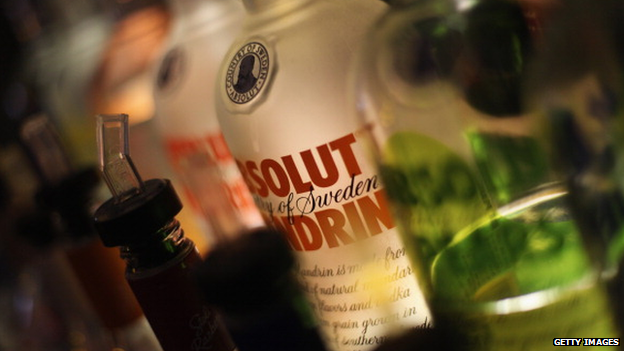
Acetaldehyde is then broken down into acetic acid (the ingredient in vinegar).
After this it's broken down into fatty acids, carbon dioxide or water, all of which the body likes.
However if you drink more than your liver can process, you start to get drunk.
This makes your blood-alcohol level rise. It is this that helps decide drink-drive limits.
Blood-drunk
Currently, the drink-drive limit is 80mg of alcohol per 100ml of blood in England and 50mg of alcohol per 100ml of blood in Scotland.
Forensic toxicologist Dr Hazel Torrance says that on average, it takes a person an hour to clear between 15mg and 18mg of alcohol per 100ml of blood.
In real terms, that 50mg limit would mean an average man can drink just under a pint of beer or a large glass of wine and women could drink a half a pint of beer or a small glass of wine.
Having zero tolerance is not thought to be practical because alcohol can be found in things like mouthwash and desserts. However alcohol does not occur in the body naturally.
Bubbles gone to your head?
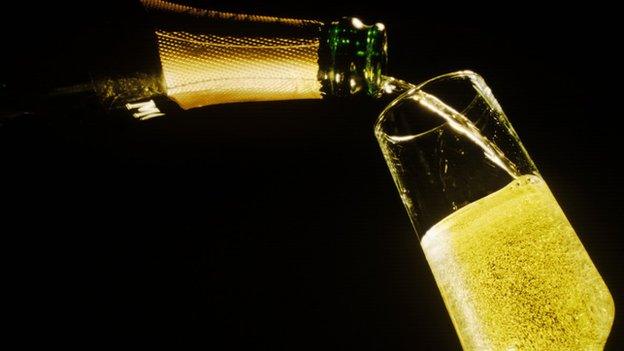
A glass of champagne on an empty stomach can make many people feel tipsy
Who you are and what you do alters the effects of alcohol has on your body.
Eating a large meal before you drink slows down the effects of alcohol. This is because when you eat the combined alcohol and food stays longer in the stomach.
This means the booze isn't released into the bloodstream as quickly.
Fizzy alcohol will make you feel the effects of alcohol more quickly as the bubbles increase the pressure in your stomach, forcing alcohol into your bloodstream faster.
Women can't hold their drink?
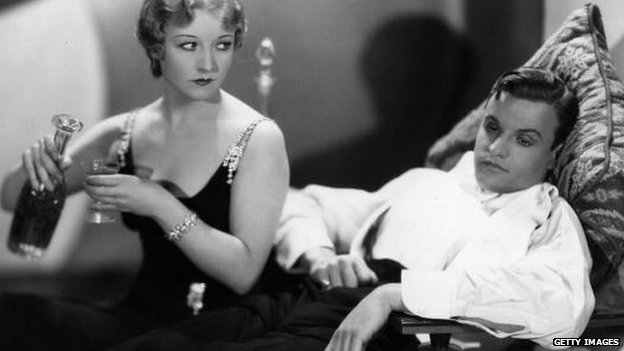
In general, women process alcohol less quickly than men
The other thing that can affect how alcohol is absorbed is your sex.
This is because men tend to have more muscle tissue than women.
Muscle has more water than fat, so alcohol will be diluted more in a person with more muscle tissue.
Women are also thought to have less of the enzyme alcohol dehydrogenase, which breaks down alcohol, so they will get drunk more easily.
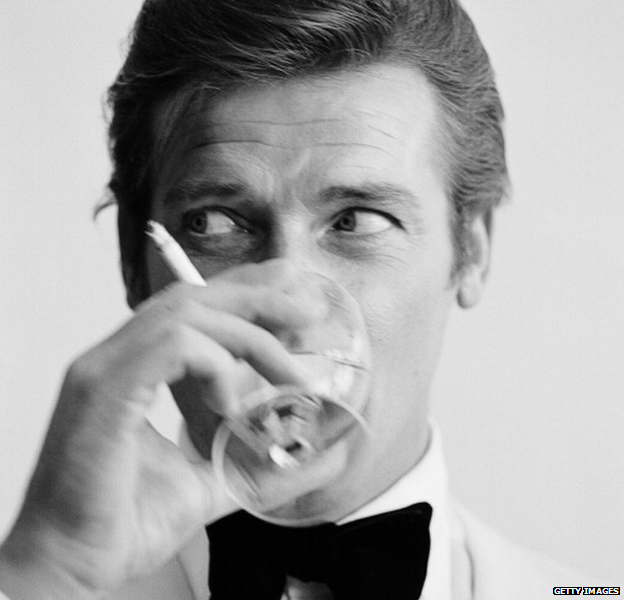
James Bond: not a healthy man, but with his age and all those martinis, his alcohol tolerance is likely to be high
Dr Nick Knight told Newsbeat: "Age can affect how you process alcohol too.
"Alcohol tends to be processed quicker by older people.
"People don't really know why but I suspect it's something to do with the fact that the more exposure to alcohol you have, the more the key enzymes that break down alcohol in your liver increase.
"That's why people talk about having an increased tolerance to alcohol, because the liver has adapted to cope with it.
"Stress can also affect how quickly you get drunk as when you are more stressed you get an influx of different hormones in the body including the stress hormone cortisol.
"This can increase the metabolism of alcohol in the liver. It can mean it is metabolised faster."
Taking risks
Particular effects of alcohol on the body make drinking dangerous for drivers. Alcohol affects the brains 'neurotransmitters', the chemicals in the brain which carry messages to other parts of the body and tell it what to do.
Alcohol makes these neurotransmitters go a bit haywire.
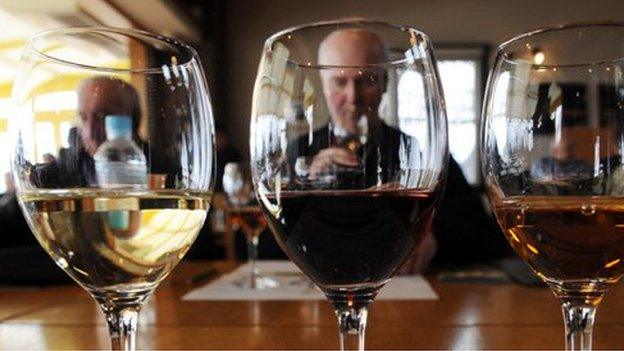
Just one glass of wine can put you over the limit
Dr Knight said: "There's one key neurotransmitter called Gaba (Gamma-Aminobutryric Acid). What Gaba does normally is dampen down the responses. When you get drunk and have more alcohol, you increase the amount of Gaba and that slows down your brain cells."
"A number of processes slow down. You get a reduction in your executive function, so judgement, your decision making.

"You become less inhibited and you are tempted to take more risks than you would usually. In the case of driving, you think you can make that corner, you think there is enough space between you and the car in front, and so on.
"There's the physical aspect too: the motor skills. This is how we use our arms and legs and our hands: how we make that decision to turn the wheel when we drive.
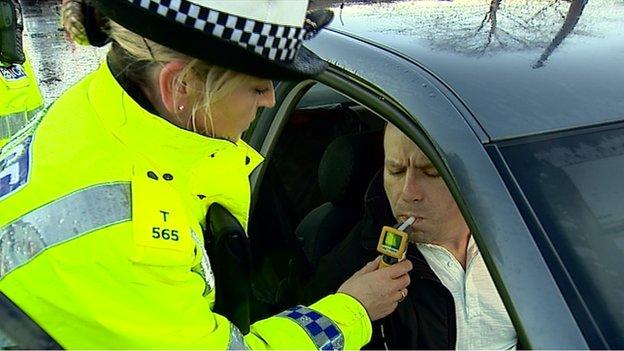
The change brings Scotland into line with most of the rest of Europe
"Essentially what happens is you have that increase in that chemical Gaba and that reduction in communication in your brain cells.
"It means what your eyes see and what it tells your brain slows down. Then what your brain tells your muscles to do is also slower. Your reactions are poorer."
If you are affected by the issues in this article, helplines and additional information can be found on Radio 1's advice pages.
Follow @BBCNewsbeat, external on Twitter and Radio1Newsbeat, external on YouTube